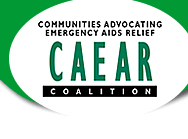



Press Releases
July 7, 1999
FOR
IMMEDIATE RELEASE
Congress Must Reauthorize the Ryan White CARE Act to Meet the Growing Needs of Low Income, Uninsured and Underinsured People Living with HIV/AIDS
Consensus Position Paper from Leading AIDS Coalition Lays Foundation for Legislative Process
The services
provided through the federal Ryan White CARE Act are crucial to the health
and living conditions of people with HIV/AIDS throughout the U.S. and
Congress must maintain the program's structure and emphasis on local
control to ensure its continued success, according to a position paper
released today by the Cities Advocating Emergency AIDS Relief (CAEAR)
Coalition.
The paper represents input from hundreds of individuals and organizations throughout the U.S, including people with HIV/AIDS, community leaders, public health departments, community health clinics, and AIDS service organizations, and offers consensus on a number of important policy issues that will be faced by Congress during reauthorization of the CARE Act.
"The CARE Act is truly how America responds to AIDS and next year's reauthorization is the best opportunity the nation has to recommit itself to providing people with HIV and AIDS with services that will extend and improve their lives," said Matthew McClain, Chair of the CAEAR Executive Committee.
An estimated 600,000-900,000 individuals are living with HIV/AIDS in the U.S. and, after the Medicaid program, the CARE Act represents the single largest federal investment in the care and treatment of people with HIV/AIDS.
Title I of the CARE Act provides emergency assistance to the 51 communities hardest hit by the HIV epidemic and Title III provides direct funding to 181 community-based and public health centers in 43 states, the District of Columbia and Puerto Rico. Two-thirds of those served through Titles I and III are people of color. The CARE Act was first passed by Congress in 1990 and reauthorized in 1996 for five years through September 30, 2000.
"This paper reflects the real world experiences of hundreds of people living and working on the frontlines and the recommendations, if implemented, will make the CARE Act even more effective and efficient in delivering meaningful services to those in greatest need," said McClain.
Key coalition positions regarding CARE Act reauthorization include support for:
CAEAR is a national coalition that advocates for sound public health policies and resources related to the critical health care and supportive service needs of people living with HIV disease in the United States. The Coalition is a national representative organization focusing on the needs of individuals and programs dependent on resources from Title I and Title III of the CARE Act.
An overview of the policy positions is attached and the full text of the position paper is available at: http://www.hivdent.org/publicp/caearc/ppfinv10699.htm
Who We Are | Advocacy | Join the Coalition | Upcoming Events
Links | Board of
Directors | Members Only
Home
CAEAR
Coalition
P.O. Box 21361
Washington, DC 20009-1361
Phone:
202-789-3565 Fax: 202-332-7087
E-mail: http://www.caear.org/Templates/info@caear.org